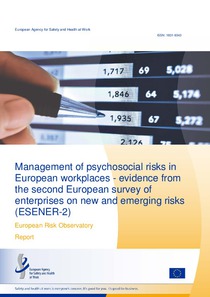Management of psychosocial risks in European workplaces: evidence from the second European survey of enterprises on new and emerging risks (ESENER-2)
"This report examines barriers to and drivers of workplace psychosocial risk management, and how this is influenced by different national and organisational contexts. The exposure of workers to psychosocial risks is increasing. However, the level of risk and the effectiveness of management vary...
| Main Authors: | , , , |
|---|---|
| Institution: | ETUI-European Trade Union Institute |
| Format: | TEXT |
| Language: | English |
| Published: |
Luxembourg
2018
Publications Office of the European Union |
| Subjects: | |
| Online Access: | https://www.labourline.org/KENTIKA-19304933124911221159-Management-of-psychosocial-ris.htm |
| Summary: | "This report examines barriers to and drivers of workplace psychosocial risk management, and how this is influenced by different national and organisational contexts. The exposure of workers to psychosocial risks is increasing. However, the level of risk and the effectiveness of management vary across sectors and countries.
Based on the findings of a quantitative analysis of ESENER-2 data combined with other country-specific data, it shows that the national context — culture, economy and occupational safety and health initiatives by social partners — is related to the level of psychosocial risk management in the workplace. It also reveals that management commitment and worker involvement are likely to be most effective organisational drivers of managing psychosocial risks, regardless of the national context. The practical implications of these findings are also discussed." |
|---|---|
| Physical Description: | 61 p. Digital |

